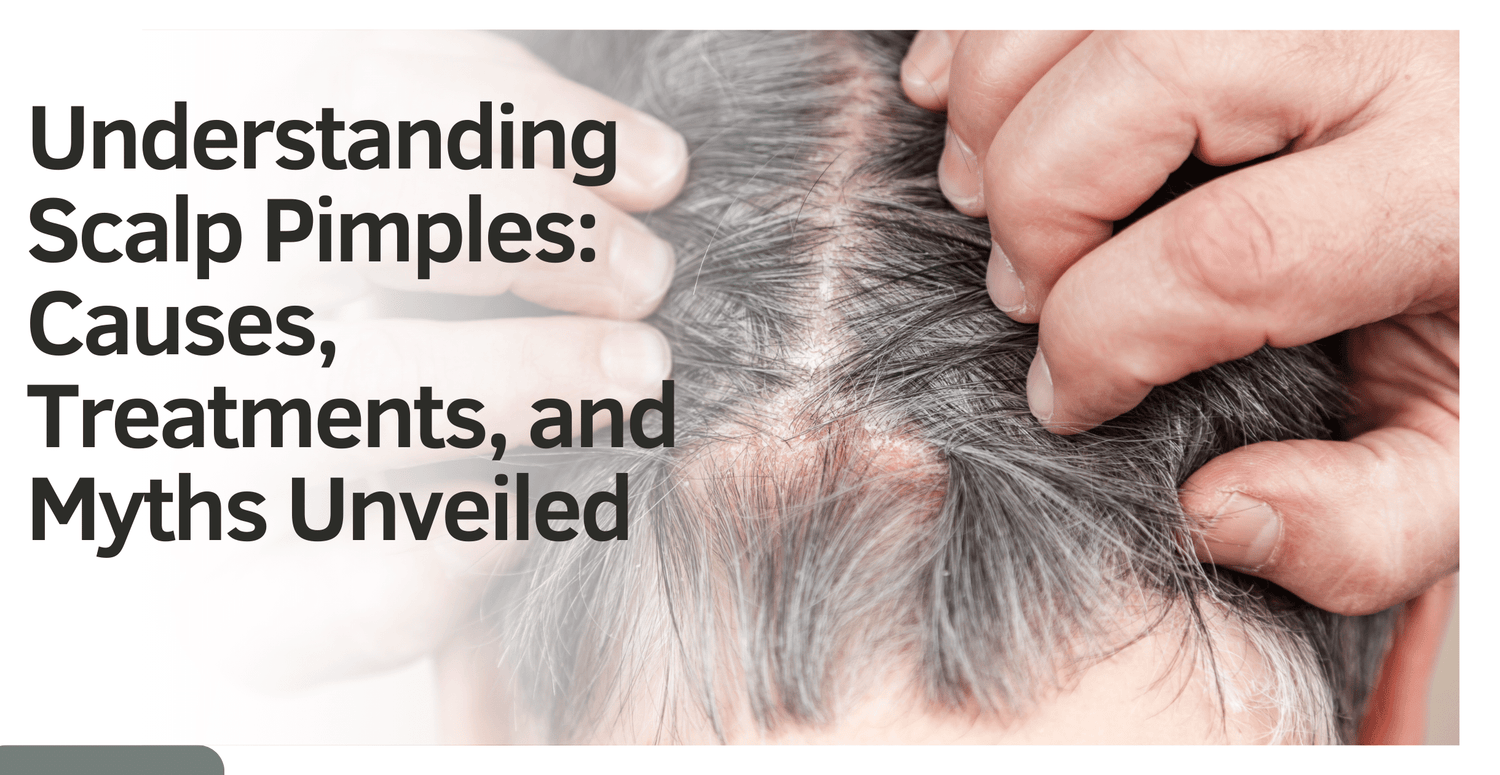Scalp pimples, also known as scalp acne or scalp folliculitis, can be a bothersome and sometimes unsightly condition. This article will be a detailed guide, debunking popular misunderstandings about scalp pimples and delving into the reasons and effective remedies.
Unveiling the Causes and Factors Behind Scalp Pimples
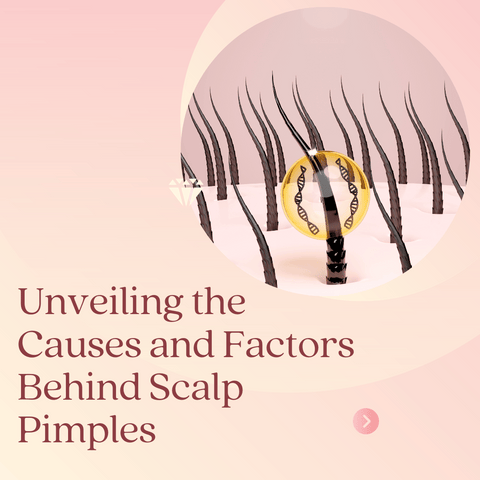
Scalp pimples, also known as scalp acne or scalp folliculitis, can be an annoying and occasionally painful condition. Understanding the underlying reasons and contributing variables is critical for properly treating scalp pimples. This blog will discuss the numerous triggers and elements that contribute to the development of scalp pimples. Learn more about the causes and contributing factors of scalp pimples so you can make more informed decisions regarding your scalp care and overall well-being.
What Are Scalp Pimples and How Do They Form?
Scalp pimples, also known as scalp acne or scalp folliculitis, are small, red, pimple-like lesions on the scalp that can develop. They appear on the scalp in the same way as facial or body acne does, due to clogged hair follicles. Hair follicles, sebum production, clogged follicles, inflammation, and different forms of scalp pimples are all examples of how they occur. Proper scalp care, the use of appropriate hair products, and lifestyle changes can help eliminate scalp pimples and maintain a healthy scalp in many circumstances. If the issue worsens or persists, see a dermatologist for a proper diagnosis and treatment plan.
Common Causes of Scalp Pimples: From Infections to Irritations
Scalp pimples can be caused by a variety of factors, including infections and irritations. Understanding these typical reasons can assist you in identifying and addressing the underlying problem. Folliculitis, high sebum production, hair products, tight hairstyles, heat and sweat, hormonal fluctuations, stress, allergies, poor hygiene, underlying skin problems, medications, and genetics are some of the leading causes of scalp pimples. If scalp pimples persist or worsen despite your efforts to address the underlying cause, see a dermatologist for a professional evaluation and customised treatment plan.
Debunking Common Myths About Scalp Pimples
Debunking Common Scalp Pimple Myths:
-
Myth 1: Scalp pimples are caused by poor hygiene: Fact: While excellent hygiene is important for general skin health, scalp pimples are not primarily the result of bad hygiene. Excess sebum production, hair product use, and bacterial or fungal infections are the most typical causes.
-
Myth 2: Regular shampooing prevents pimples on the scalp: Fact: Excessive shampooing can deplete the scalp's natural oils, potentially aggravating scalp breakouts. The secret is to find the ideal ratio of shampooing to remove extra oil and debris without going overboard.
-
Myth 3: Eating greasy foods causes scalp acne: Fact: There is no direct link between eating greasy or oily foods and getting scalp pimples. Diet can affect the condition of the skin overall, but sebum production and follicular irritation are the main causes of scalp pimples.
-
Myth 4: Scalp Pimples Can Spread Disease: Fact: Most scalp pimples are not contagious. They are frequently the result of individual factors such as skin type, hair care practises, and environmental conditions rather than the spread of an infection.
-
Myth 5: Scratching Aids in the Removal of Scalp Pimples: Fact: By introducing bacteria from your nails into the affected area when you scratch your scalp, you risk infection and the development of additional pimples. It is best to refrain from scratching and get medical attention.
-
Myth 6: Scalp acne is only a problem for those with oily skin: Fact: People with various skin types, including dry or sensitive skin, can experience scalp pimples. Excess sebum production can also contribute to them. The causes may differ, but people with oily skin are not the only ones who can get scalp pimples.
-
Myth 7: The main reason why scalp pimples appear is stress: Fact: Stress rarely acts as the only cause of skin problems, including scalp pimples. However, it can exacerbate many skin problems. More important factors include sebum production, hair product use, and hygiene.
-
Myth 8: Scalp Pimples Will Go Away by themselves: Fact: Some mild scalp pimples may resolve on their own, but others may persist or worsen if not treated properly. It is best to address the underlying cause and, if necessary, seek treatment.
-
Myth 9: Pimples on the scalp are always acne: Fact: Although scalp pimples can resemble acne, they can also result from psoriasis, folliculitis, or even fungal infections. A correct diagnosis is required for effective treatment.
-
Myth 10: Over-the-counter Products Can Treat Scalp Pimples On Their Own: Fact: While over-the-counter remedies can help manage scalp pimples, some situations might necessitate prescription medication or expert advice. If you have severe or persistent scalp zits, see a dermatologist.
Effective Treatments for Scalp Pimples: From Home Remedies to Professional Solutions
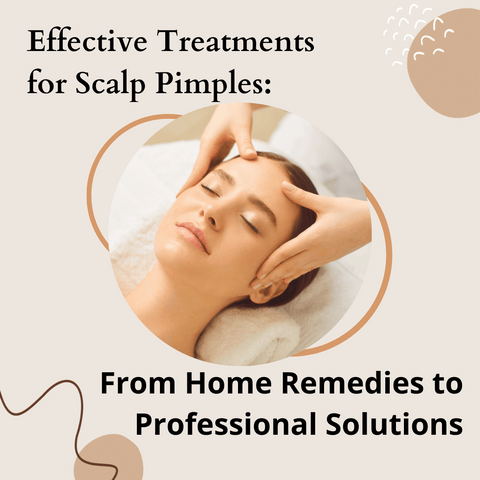
Depending on the severity and underlying cause of the condition, there are various effective treatments for scalp pimples. Here are some scalp acne treatments, ranging from natural cures to medical options:
-
Proper scalp care: It is important to keep your scalp clean. Use a gentle, sulfate-free shampoo to clean your hair on a regular basis, but avoid overwashing, which can strip the scalp of its natural oils.
-
OTC (over-the-counter) medications: Look for shampoos and treatments that contain active ingredients like salicylic acid, benzoyl peroxide, or sulphur. These can aid in the unclogging of hair follicles and the reduction of inflammation. Only use as instructed.
-
Tea tree oil: Tea tree oil has natural antimicrobial properties that can help treat scalp pimples. Apply it to the affected area after diluting it with a carrier oil and leaving it on for a few minutes before rinsing.
-
Warm compresses: Applying a warm, damp cloth to the scalp can help open clogged pores and alleviate inflammation. Gently press the cloth against the affected area for several minutes.
-
Rinse with apple cider vinegar (ACV): Dilute ACV with water and use it as a rinse after shampooing. It can help to balance the pH of the scalp and reduce the likelihood of fungal infections.
-
Aloe vera gel: Aloe vera has anti-inflammatory and soothing properties. Apply aloe vera gel to the affected area and leave it on for 15-20 minutes before rinsing.
-
Prescription medications: Consult a dermatologist if over-the-counter treatments do not work. They may prescribe stronger topical or oral medications, such as antibiotics or antifungals, depending on the cause of the scalp pimples.
-
Steroid injections: A dermatologist may administer steroid injections to reduce swelling and pain in severe cases of inflammation or cystic scalp pimples.
-
Antifungal shampoos: If a fungal infection is suspected, antifungal shampoos containing ingredients like ketoconazole or selenium sulphide may be prescribed to treat the underlying cause.
-
Light therapy: Some dermatologists offer light therapy treatments, such as photodynamic therapy (PDT) or laser therapy, to target the bacteria or fungi that cause scalp pimples.
-
Changes in lifestyle: Consider making changes to your lifestyle to reduce risk factors. This may entail avoiding tight hairstyles, managing stress, and changing your diet if it is affecting your skin's condition.
-
Personalised advice: Consult a dermatologist or healthcare provider for an accurate diagnosis and a treatment strategy tailored to your specific scalp condition. They can advise you on the most effective treatments based on the cause and severity of your scalp pimples.
It is important to remember that what works for one person may not work for another, so when experimenting with different treatments, patience and consistency are essential. Picking or scratching pimples on the scalp can cause infection and scarring. If your condition worsens or does not improve with home remedies, you should seek professional help.
Over-the-Counter Remedies: Exploring Options for Scalp Pimple Treatment
Over-the-counter (OTC) remedies can be a quick and easy way to treat scalp pimples. Here are some over-the-counter options for scalp pimple treatment:
-
Salicylic Acid Shampoo: Shampoos containing salicylic acid can help exfoliate the scalp, remove dead skin cells, and unclog hair follicles. To ensure proper usage, follow the instructions on the product label.
-
Benzoyl Peroxide Shampoo: Benzoyl peroxide is effective at killing bacteria and reducing inflammation. To treat scalp pimples, look for shampoos containing benzoyl peroxide. Be cautious because it has the potential to bleach hair and fabrics.
-
Sulfur-Based Shampoo: Sulphur has antibacterial and antifungal properties that can aid in the treatment of scalp pimples. Sulfur-based shampoos are available over-the-counter and should be used as directed.
-
Medicated Dandruff Shampoos: Some medicated dandruff shampoos contain active ingredients such as selenium sulphide, coal tar, or ketoconazole. These ingredients may be useful in treating scalp conditions such as pimples.
-
Scalp Scrubs and Exfoliants: OTC scalp scrubs and exfoliants can help remove dead skin cells and debris from the scalp, lowering the risk of clogged pores and pimples. For best results, adhere to the product's instructions.
-
Topical Acne Creams or Gels: Some over-the-counter acne treatments or gels containing salicylic acid or benzoyl peroxide can be administered straight to the scalp to treat pimples. Apply it sparingly and avoid using it on the hair.
-
Tea Tree Oil Products: Tea tree oil has inherent antibacterial properties. To help combat scalp pimples, look for shampoos, conditioners, or topical treatments that contain tea tree oil. Dilution may be required for sensitive skin.
-
OTC Hydrocortisone Cream: If scalp pimples are causing itching or inflammation, over-the-counter hydrocortisone treatments can help.
-
Scalp Tonic or Serums: Some haircare companies sell scalp tonics or serums that are intended to treat scalp concerns such as acne. These products may have antimicrobial and calming properties.
-
Natural and herbal remedies: Some people find relief from scalp pimples by using aloe vera gel, neem oil, or witch hazel. Before using any new product on your scalp, always conduct a patch test.
When using OTC remedies, it is critical to carefully follow the product instructions and to be patient, as results may take some time to appear. If your scalp pimples persist, worsen, or cause severe discomfort, see a dermatologist or healthcare professional for a more personalised treatment plan and an assessment of the underlying causes.
Natural Remedies for Scalp Pimples: Harnessing the Power of Mother Nature
Natural solutions for scalp pimples might be helpful while avoiding harsh chemicals. Tea tree oil, aloe vera gel, apple cider vinegar (ACV) rinse, neem oil, witch hazel, neem leaves paste, honey, and cinnamon mask, turmeric paste, fenugreek seeds paste, green tea rinse, and baking soda scrub are some natural remedies that harness the power of nature to help alleviate scalp pimples. A patch test is required before using any natural cure to ensure that you do not have an allergic response or skin sensitivity to the substances. Furthermore, when taking natural therapies, be patient because benefits may take time to appear. If your scalp pimples persist or worsen, seek expert advice from a dermatologist.
Seeking Professional Help: Scalp Pimple Treatments from Dermatologists
When scalp pimples are persistent, severe, or causing discomfort, seeking professional help from a dermatologist is advisable. Dermatologists can provide targeted treatments and recommendations based on the specific cause and severity of your scalp condition. Here are some treatments and procedures that dermatologists may recommend for scalp pimples:
-
Prescription medications: Dermatologists can prescribe topical or oral medications to treat the underlying causes of scalp pimples. These may include antibiotics, antifungal medications, steroids, and retinoids.
-
Corticosteroid Injections: Dermatologists may use corticosteroid injections to reduce inflammation and promote healing in cases of large, painful, or recurring cystic scalp pimples.
-
Photodynamic Therapy (PDT): PDT involves applying a photosensitizing agent to the scalp and then exposing it to a specific wavelength of light. This treatment has the ability to kill bacteria while also reducing inflammation.
-
Laser Therapy: Laser therapy, such as red or blue light therapy, can be used to target bacteria, reduce inflammation, and promote skin healing. It is frequently used in severe or treatment-resistant cases.
-
Extraction or Drainage: Dermatologists can safely extract the contents of large or painful scalp pimples. This can help to alleviate pain and promote healing.
-
Chemical Peels: Chemical peels containing salicylic acid or other exfoliating agents can be used to unclog pores and reduce the visibility of scalp pimples in some cases.
-
Microdermabrasion: Microdermabrasion involves the use of a machine to exfoliate the skin, which may aid in the removal of dead skin cells and the reduction of the appearance of scalp pimples.
-
Scalp Biopsy: In cases where the cause of scalp pimples is unknown or there is suspicion of an underlying medical condition, a dermatologist may recommend a scalp biopsy to obtain a tissue sample for further analysis.
-
Recommendations for Lifestyle and Products: Dermatologists can advise on proper scalp care, recommend appropriate hair products, and suggest lifestyle changes to avoid future scalp pimples.
-
Follow-Up Care: Dermatologists frequently provide follow-up care after treatment to monitor progress and make any necessary adjustments to the treatment plan.
If you have persistent or severe scalp pimples, you should see a dermatologist for a thorough examination. They can offer tailored treatment options based on the underlying cause of your condition, ensuring effective management and relief. Additionally, dermatologists can provide valuable advice on scalp care and prevention strategies to help you maintain a healthy scalp in the long run.
Maintaining a Healthy Scalp: Prevention and Care Tips
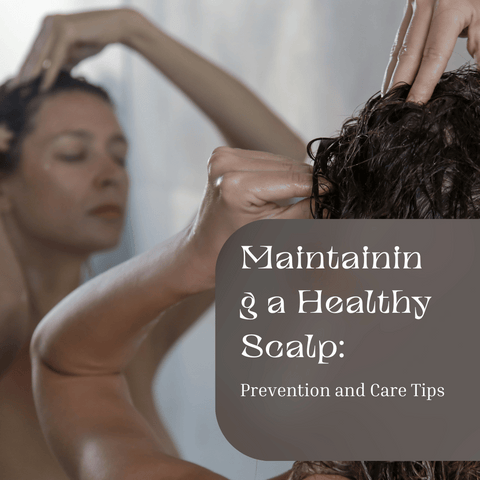
Maintaining a healthy scalp is critical for avoiding pimples and other scalp issues. Here are some preventative and maintenance measures to help you achieve and maintain a healthy scalp:
-
Washing on a regular basis: Wash your hair on a regular basis with a gentle, sulfate-free shampoo. Your hair type and lifestyle will determine how often you should wash your hair. Clogged pores are reduced when your hair and scalp are clean.
-
Proper shampooing technique: When shampooing, use your fingertips to massage the scalp to help remove dirt, excess oil, and dead skin cells. Rinse thoroughly to remove any remaining shampoo residue.
-
Conditioner use: Conditioners should be used as needed to keep your hair moisturised. Apply conditioner primarily to the hair shafts and ends, avoiding the scalp if you have oily hair or scalp pimples.
-
Avoid harsh ingredients: Choose hair care products that are free of harsh chemicals and irritants. Look for products labeled as "sulfate-free" and "non-comedogenic" to reduce the risk of scalp irritation and clogged pores.
-
Avoid overwashing: While cleanliness is important, overwashing your hair can deplete the natural oils in your scalp, potentially causing dryness and irritation. Find a happy medium for your hair type and lifestyle.
-
Keep hair tools clean: Clean your brushes, combs, and hair accessories on a regular basis to avoid the accumulation of oils and bacteria that can transfer to your scalp.
-
Gentle drying: After washing, gently pat your hair with a soft towel to remove any excess moisture. Rubbing too vigorously can irritate the scalp.
-
Tight hairstyles: Avoid hairstyles that cause constant tension on the scalp, such as tight ponytails, braids, or buns. These conditions can cause follicular irritation and pimples (traction folliculitis).
-
Sun protection: When spending extended periods of time outside, wear a hat or apply a sunscreen designed specifically for the scalp to protect your scalp from the sun's harmful UV rays.
-
Balanced diet: Maintain a balanced diet rich in vitamins, minerals, and nutrients that support overall skin and scalp health. Zinc, biotin, and omega-3 fatty acids are particularly beneficial.
-
Stress management: As stress can exacerbate scalp issues, manage it through relaxation techniques, exercise, and mindfulness practises.
-
Avoid using hairstyling products: Avoid using hairstyling products such as gels, hairsprays, and mousse on a regular basis, as these can contribute to scalp buildup and irritation.
-
Consult with a dermatologist: If you have persistent scalp problems, consult a dermatologist. They can perform a comprehensive evaluation, diagnose underlying conditions, and recommend appropriate treatments.
-
Hydration: Drink plenty of water to keep your body and skin, including your scalp, hydrated.
-
Regular checkups: Schedule regular scalp checkups with your hairstylist or dermatologist to monitor your scalp's health and address any emerging issues promptly.
By following these prevention and care tips, you can maintain a healthy scalp, reduce the risk of scalp pimples, and enjoy comfortable, beautiful hair. Individual factors, such as hair type and skin sensitivity, may influence your scalp care routine, so make adjustments as needed to meet your specific needs.
Scalp Hygiene: Essential Practices for Preventing Scalp Pimples
Maintaining adequate scalp cleanliness is critical for preventing scalp pimples and supporting overall scalp health. Following are some essential practises for healthy scalp hygiene:
-
Regular washing: Use a gentle, sulfate-free shampoo to wash your hair every day. The frequency with which you wash your hair is determined by your hair type and lifestyle. Clean hair and scalp help to keep grime, oil, and dead skin cells at bay.
-
Proper shampooing technique: When shampooing, softly massage the scalp with your fingertips. This aids in the removal of pollutants and increases blood circulation. Fingernails should be avoided because they might scrape and irritate the scalp.
-
Adequate rinsing: Rinse your hair well to remove all shampoo and conditioner residue. Insufficient rinsing might result in product accumulation, which can clog hair follicles and cause scalp problems.
-
Use conditioner wisely: Apply conditioner to the lengths and ends of your hair rather than the scalp. Avoid using conditioner on your scalp if you have an oily scalp or are prone to scalp pimples.
-
Avoid hot water: Wash your hair and scalp with lukewarm water. Hot water can strip natural oils from the scalp, causing dryness and irritation.
-
Be Gentle with Wet Hair: Wet hair is more fragile, so treat it with caution. When towel-drying your hair, avoid rubbing vigorously, as this can cause hair breakage and scalp irritation.
-
Clean Hair Tools: Clean your hairbrushes, combs, and other hair accessories on a regular basis to remove oils, dirt, and bacteria that can be transferred to your scalp.
-
Avoid Tight Hairstyles: Choose hairstyles that do not put too much strain on the scalp. Tight ponytails, braids, and updos can cause follicular irritation and pimples (traction folliculitis).
-
Limit Hair Products: Reduce the use of hairstyling products such as gels, hairsprays, and mousse, which can contribute to product buildup on the scalp.
-
Sun Protection: When exposed to the sun, protect your scalp from UV radiation by wearing a wide-brimmed hat or applying sunscreen specifically formulated for the scalp.
-
Keep Scalp Dry: After swimming or sweating, thoroughly dry your scalp and hair to prevent fungal growth and irritation.
-
Stress Management: As stress can exacerbate scalp issues, manage it through relaxation techniques, exercise, and mindfulness practises.
-
Dietary Options: Eat a well-balanced diet rich in nutrients such as omega-3 fatty acids, biotin, and zinc, which promote overall skin and scalp health.
-
Regular Checkups: Schedule regular scalp checkups with your hairstylist or dermatologist to monitor your scalp's health and address any emerging issues promptly.
By incorporating these essential scalp hygiene practises into your hair care routine, you can reduce the risk of scalp pimples and maintain a clean and healthy scalp. Adjust your scalp care routine to suit your unique needs, taking into account your hair type, skin sensitivity, and any specific scalp conditions you may have.
Dietary Factors and Scalp Pimples: Debunking the Connection
The relationship between dietary components and scalp pimples, as well as acne in general, has long been a source of discussion and investigation. While there is no one-size-fits-all solution, here is a summary of current knowledge about the relationship between diet and scalp pimples:
-
High-Glycemic Foods: Some studies have suggested that high-GI diets, such as sugary meals and refined carbs, may contribute to acne, especially scalp pimples. High GI meals can raise insulin levels, influencing oil production and inflammation in the skin.
-
Dairy Products: There is some evidence that dairy products, particularly skim milk, may be linked to an increased incidence of acne. Dairy products contain hormones and growth factors that may have an effect on the skin.
-
Fatty Foods: Some research has looked into the link between diets high in saturated and trans fats and acne. High-fat diets may cause inflammation, which may aggravate skin disorders such as scalp pimples.
-
Nutrient Deficiencies: Vitamin and mineral deficiencies, such as vitamin A, vitamin D, and zinc, may have an impact on skin health. Adequate intake of these nutrients is required for healthy skin, particularly the scalp.
-
Omega-3 Fatty Acids: Omega-3 fatty acids, which may be found in fatty fish, flaxseeds, and walnuts, have anti-inflammatory effects and may help reduce inflammation in the skin, which may benefit those with acne-prone skin, including those with scalp pimples.
-
Hydration: Staying hydrated is critical for good skin health. Proper hydration aids in the maintenance of the skin's natural moisture balance and may lessen the likelihood of dry, flaky skin, which can contribute to scalp concerns.
-
Individual Variation: It should be noted that the association between nutrition and acne, including scalp pimples, varies from person to person. Some people may find that certain foods or dietary habits aggravate their skin, while others may not.
While there is some evidence linking nutrition to acne, further research is needed to create precise dietary suggestions for people with scalp pimples. It's important to note that various factors, including heredity, hormones, and skincare practises, can all contribute to skin disorders. If you suspect that your food is causing your scalp pimples, make gradual dietary modifications and evaluate their influence on your skin. A dermatologist or other healthcare professional can provide personalised advice and recommendations for treating scalp pimples and keeping good skin through dietary changes and other skincare practises.
Stress Management and Scalp Health: Understanding the Link
Stress can have a negative impact on scalp health and lead to a variety of scalp problems, including scalp pimples. Understanding the relationship between stress and scalp health is critical for successful stress management and prevention. Here are some examples of how stress can impact the scalp:
-
Increased Sebum Production: Stress causes the release of stress hormones such as cortisol, which can stimulate the scalp's sebaceous (oil) glands to create more sebum (oil). Excess sebum can clog hair follicles and promote the formation of scalp pimples.
-
Inflammation: Chronic stress can cause widespread inflammation in the body, including the scalp. Inflammation can aggravate pre-existing scalp disorders and raise the likelihood of developing scalp pimples.
-
Weakened Immune Response: Stress can impair the immune system, making it less efficient at fighting bacterial and fungal infections on the scalp. This can make you more prone to scalp problems like folliculitis and dandruff.
-
Hair Loss: Stress-related hair loss problems, such as telogen effluvium, can cause thinning or shedding of hair on the scalp. The scalp may become more prone to irritation and acne as it gets more apparent.
-
Scratching and Picking: Stress can cause nervous habits such as scratching or plucking at the scalp, which can harm the skin barrier and introduce bacteria from the fingers, potentially resulting in infections and pimples.
-
Trichotillomania: Severe stress can aggravate trichotillomania, a hair-pulling disorder. This can harm the scalp and hair follicles, increasing the likelihood of scalp problems.
-
Poor Self-Care: Individuals may overlook their regular self-care activities, including scalp hygiene, during stressful times. This can cause dirt, oil, and dead skin cells to accumulate on the scalp, causing scalp pimples.
-
Worsening of Pre-existing Conditions: If you already have scalp disorders such as psoriasis, eczema, or seborrheic dermatitis, stress can aggravate them, triggering flare-ups and perhaps creating scalp pimples.
-
Delayed Healing: Stress can interfere with the body's natural healing processes. This means that existing scalp pimples or other problems may take longer to resolve when stress levels are high.
If stress is negatively impacting your scalp health and causing scalp pimples, seek advice from a healthcare professional or dermatologist on how to manage stress and address any scalp issues that may have arisen as a result of stress.
Busting Common Myths About Scalp Pimples
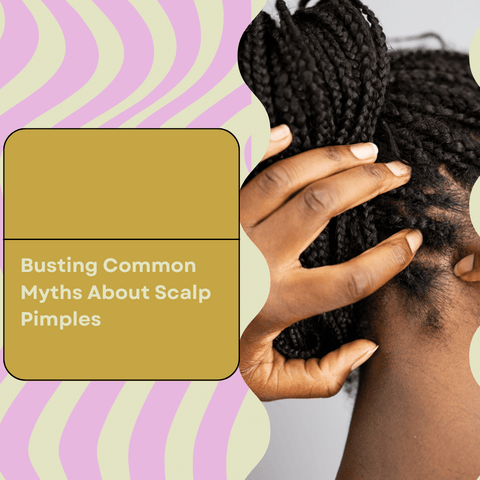
Let's debunk some common myths about scalp pimples, such as that scalp pimples are always caused by poor hygiene, that scalp pimples only affect people with oily hair, frequent shampooing prevents scalp pimples, that scalp pimples are contagious, that scratching helps get rid of scalp pimples, stress is the primary cause of scalp pimples, that scalp pimples will disappear on their own, that scalp pimples are always acne, and over-the-counter products alone can cure scalp pimple Understanding the facts behind these beliefs will help you make more educated decisions about efficiently managing and preventing scalp pimples. If you're unsure about the reason or treatment of your scalp disease, seek advice from a healthcare practitioner or dermatologist.
Myth vs. Reality: Clarifying Misconceptions About Scalp Pimples
Let us dispel some myths about scalp pimples and separate myth from reality:
-
Myth 1: Scalp Pimples and Scalp Acne Are the Same: Reality: While both scalp pimples and scalp acne involve the formation of small bumps on the scalp, their causes can differ. Folliculitis, fungal infections, and other skin problems can all cause scalp pimples. Excess sebum production and clogged hair follicles are the same reasons that cause face and body acne.
-
Myth 2: Scalp pimples are always painful: Reality: The feeling of a scalp pimple can differ. While some are painful and tender to the touch, others are itchy or painless. The sensation can vary according to the underlying cause and stage of development.
-
Myth 3: Scalp pimples are only found in adolescents: Reality: Adolescents are not the only ones who get pimples on their scalp. Scalp acne can occur in people of any age due to a number of factors, such as hormonal changes, stress, hair care routines, and skin type.
-
Myth 4: Popping Scalp Pimples Helps Clear Them: Reality: Squeezing or popping pimples on the scalp increases the risk of infection and scarring by introducing bacteria. It is best to seek appropriate treatment and care rather than picking or popping them.
-
Myth 5: Poor hygiene is always the root of scalp pimples. Reality: While maintaining good scalp hygiene is important, other factors, such as hormonal imbalances, fungal infections, folliculitis, or genetic predisposition, can also cause scalp pimples.
-
Myth 6: Scalp pimples are brought on by excessive hair washing: Reality: Constantly washing your hair can dehydrate and irritate your scalp by robbing it of its natural oils. However, neglecting to regularly wash the hair and scalp can result in a buildup of grime, oil, and dead skin cells that can clog hair follicles and encourage the emergence of pimples.
-
Myth 7: Scalp Pimples Always Spread Infection: Reality: Scalp acne usually does not spread. They are frequently the result of individual factors such as skin type, hair care practises, and environmental conditions rather than the spread of an infection.
-
Myth 8: Scalp pimples will go away on their own: Reality: While some mild scalp pimples may go away on their own, others may persist or worsen. Proper care and treatment may be required to address the underlying cause and promote healing.
-
Myth 9: The Primary Cause of Scalp Pimples Is Stress: Reality: While stress can aggravate scalp problems, it is rarely the sole cause of scalp pimples. Sebum production, hair product use, and hygiene are more important factors.
-
Myth 10: Allergic Reactions Always Cause Scalp Pimples: Reality: Allergic reactions to hair products can cause scalp irritation and pimples, but they are not the only cause. Scalp pimples can be caused by a number of disorders, including infection, inflammation, and other skin conditions.
Understanding these facts can help people better manage and treat scalp pimples, as well as seek appropriate care and treatment when necessary. If you are concerned about your scalp condition, a healthcare professional or dermatologist can provide an accurate diagnosis and treatment plan.
Achieving a Clear and Healthy Scalp: Your Guide to Scalp Pimple Management
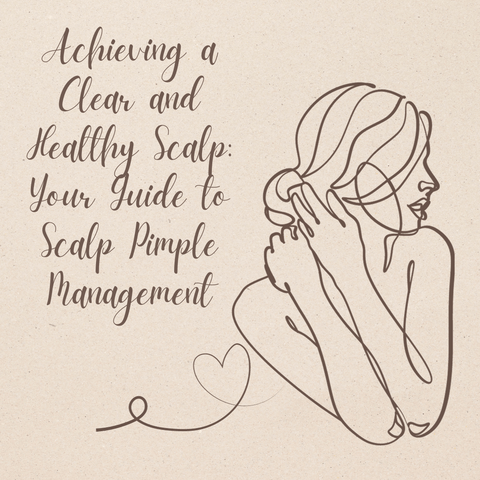
A clear and healthy scalp necessitates a mix of adequate care, lifestyle changes, and, if necessary, specialised therapies. Maintaining good scalp hygiene, proper shampooing technique, choosing suitable hair products, avoiding tight hairstyles, sun protection, stress management, a balanced diet, avoiding picking or scratching, seeking professional help, targeted treatments, natural remedies, following treatment plans, and regular checkups are all part of scalp pimple management. Adapt your scalp care routine to your hair type, skin sensitivity, and any specific scalp concerns you may have. You may develop and keep a clean and healthy scalp with adequate care and attention.




